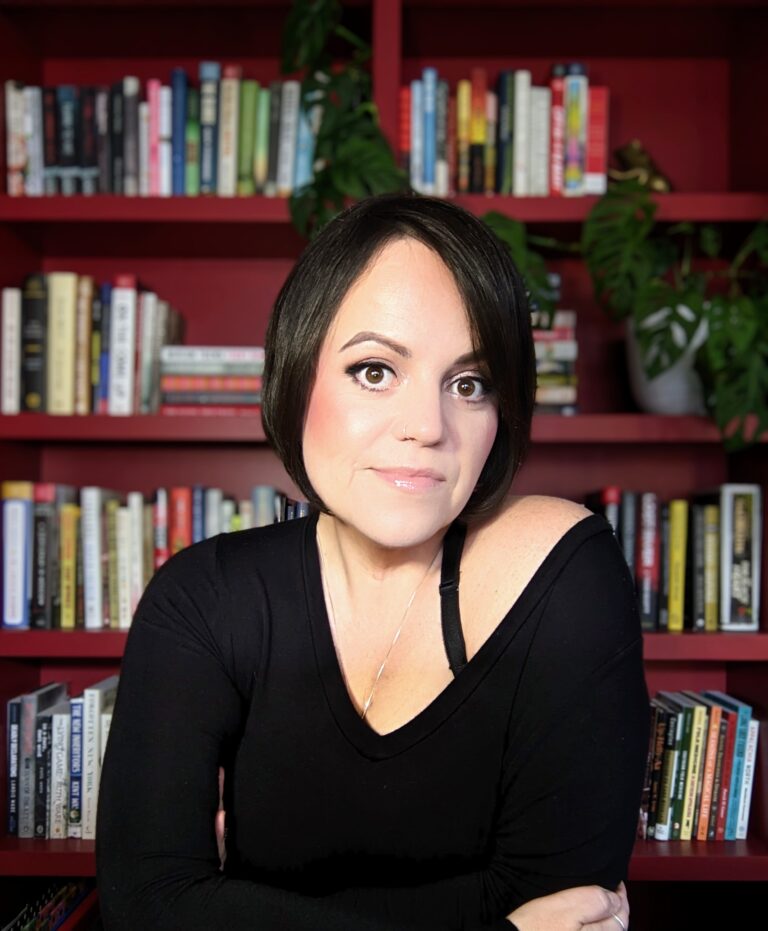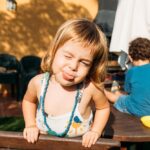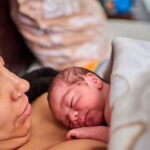When I Discovered I was a Ghost

How One Mom Lost and Found Herself After Pregnancy
Three AM. A small lamp in the corner made the lavender nursery walls glow. The sound machine hissed in the background. My first born had fallen asleep on my nipple and was mad when I tipped her up to burp. In protest, it felt, she emptied her stomach, and all my precious milk, down my chest, the front of my bra, and into my lap, before screaming starvation again. She was always mad. I was always crying. I covered the slime with a blanket so she could feed on the other breast without getting wet, but she was aggravated that I kept interrupting her to burp. I was cold, wet, and my free nipple was bleeding. It had been like this for months; counting hours of sleep on one hand, both of us needy and irritable. After, I tiptoed into the bathroom, pulled off my sopping wet clothes, and not for the first time that night, wiped myself off, and while looking for a clean shirt passed the mirror and saw it: I was translucent.
I couldn’t tell you when I started to disappear. Despite all the extra baby pounds, I’d shrunk into a shadow of my former self. I couldn’t take joy in motherhood, or in the new person I could become. I could only mourn the loss of who I had been. I missed my nice clothes and lunches out with colleagues, the date nights and dangling earrings, smelling like perfume instead of spit up, but also sleeping, oh I missed sleeping, and having conversations about topics other than pregnancy and parenthood.
I was fading.
It was so subtle, the shift from me—an interesting person; to me—a body; to me—a flesh vessel host. The slide from: How are you? How are you feeling? To: How’s the baby?
I felt it in my doctor’s office. Their lack of interest in my nausea or heartburn, or intrusive thoughts, or the terrible pain of carpal tunnel that I was just expected to ignore, and the focus on the baby’s everything. How’s mom? They would ask, but not wait for an answer before they pushed me towards the scale and strapped on the blood pressure cuff.
Soon it was friends and relatives, too. Questions about the shower, or the baby’s health, or a name, or the nursery. Occasionally questions about what I thought, or planned, but always related to parenting. Never actually about me. This sounds like I blame everyone else—I don’t. It was me, too.
I quit my job. I felt too fat to leave the house. I was obsessed with the baby, too. I was completely lost in trying to be good at something, that despite my best efforts I was obviously terrible at. I didn’t see that with every step towards motherhood, I became more and more transparent. And it was about three months after my first child was born that I discovered that I was invisible, even to myself.
I’d never been a person who dreamed of motherhood. I love my children, but they were never what I saw as my life’s purpose, and early motherhood was terrible. I was a shell, a hollow crust of a person, existing only to meet the needs of others. My husband and I had recently moved to a new state and I quit my job to stay home with the baby. I was isolated and lonely, and losing my mind.
I was a ghost.
Thankfully, three years later after my second child, I sought treatment, and discovered PPD and I had a terrific therapist suggest that part of my treatment should be finding a community, and something that I could do that was just for me.
I have friends who in a similar situation chose fitness, some chose going back to school or entrepreneurship. I chose writing because I felt so bottled up, so interrupted. I felt like I was never allowed to say what I was thinking or feeling about the hardship and pain of motherhood. About the loneliness and isolation. How I never got it right and constantly felt like I was messing everything up. I was never good enough.
Parenthood devastated me. Motherhood never felt like a blessing, instead it was an awful lot like grief and I couldn’t understand why I didn’t know this before. Why had no one warned me? I thought I must be the only one who felt this way. Every time I tried to express my unhappiness, I was met with some trite comment about enjoying every minute, or how some women weren’t able to have children. Obviously, I was not only a bad mother, but a bad person.
I joined a local writing group and started writing short memoir pieces about how I was struggling, just in case there was someone out there who felt the same. About the not sleeping and how I didn’t like nursing. About how my body was too big and foreign, and my disappointment with particular people in my life. About how I couldn’t wait for my kids to be old enough to go to preschool so I could have a whole hour to myself occasionally. I found homes for these pieces in online magazines and began to build a community. I wasn’t alone. I wasn’t the only one.
As my work was read more widely, writing about my own life started to feel exposing, and honestly, I don’t read a lot of nonfiction for fun. I prefer stories. So, I started to write those, and discovered that I could explore all of the same feelings and hurts through fiction as I could through memoir, only I didn’t feel like I was pulling all the skeletons out of my closet and leaving them on the lawn for the neighbors to see.
I spent fewer hours crying in the bathroom and more in front of a keyboard.
I published my first short story, “Porchlight Salvation,” in 2016 in a little, now defunct, literary journal (although you can read it in my short story collection) and it’s, of course, about motherhood. As is, everything I write, really; my debut novel, Songbirds and Stray Dogs, came out in 2019, yep motherhood. Last year a collection of my short work was published, it’s called Here in the Dark, and it was nominated for the prestigious Anthony Award, and two of the stories have been named to the Best American Mystery and Suspense Distinguished list, and you betcha: they’re about motherhood. My work is a blend of crime and literary fiction often called grit lit, and not easy to read because at the heart of all of it is motherhood, and motherhood is not easy either.
It’s not the publications or the kudos that sharpened my edges or gave me my color back, though. It’s all the times over the last almost 10 years that I put myself first. When I held on to my personhood with two hands and left my babies with their dad, or with the sitter, and went to a coffeeshop to work, or went to a class, or met with my writing group. It was recognizing that in order for me to be the person that I deserved to be, alongside the mother my children needed, I couldn’t be invisible, I needed to meet my needs as well as theirs, and that meant that I couldn’t allow others, or myself, to limit me to being a ghost.
Sometimes I mourn the years that I lost, but the benefit of being a writer is that I get to go back, over and over. In each story I write, I offer that mother that I was, grace. I get to whisper in her ear that it’s okay, and that trying her best is good enough, and that if occasionally she puts herself first, she’ll come back too.








